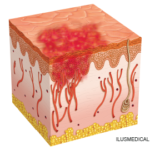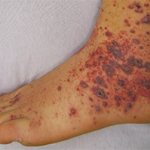“As for IgA nephropathy, results were disappointing with no difference in estimated glomerular filtration rate [eGFR] or proteinuria. We need more data,” Dr. Thiel said.5
“Patients taking dapagliflozin did much better compared with [placebo-treated patients] in regard to eGFR decline, end-stage kidney disease, and renal and cardiovascular death,” said Dr. Thiel.6
“This [treatment approach] may become of interest,” said Dr. Thiel.
Future Possibilities
Dr. Thiel concluded with a discussion of therapeutics coming down the pipeline.
- Sibeprenlimab: Sibeprenlimab binds and neutralizes a proliferation-inducing ligand (APRIL), which regulates B-cell mediated immune responses. In November 2023, phase 2 data showed a significant decrease in proteinuria and slowing of eGFR decline in patients with IgA nephropathy.9
“This [agent] may really be an interesting target in IgA vasculitis, and a phase 3 trial is ongoing in IgA nephropathy,” said Dr. Thiel.
Of note, belimumab and blisibimod, which inhibit B cell activating factor (BAFF), won’t be further investigated for this condition.
- Atacicept: Atacicept is a dual inhibitor of BAFF and APRIL. In March 2024, phase 2b data showed decreases in proteinuria and stabilization of eGFR in patients with IgA nephropathy treated with atacicept. “Results look really encouraging,” Dr. Thiel said.10
- Complement-targeting therapies (e.g., avacopan): “Most of these [treatments] are in early phase studies,” said Dr. Thiel. “Some results have been positive. Some trials have been halted. It’s not yet clear, in my opinion, whether they’ll really be a success.”
- Sparsentan: In a phase 3 trial of patients with IgA nephropathy, sparsentan, a novel, non-immunosuppressive, dual endothelin angiotensin receptor antagonist, was compared with irbesartan, an angiotensin II receptor blocker. Like several of the therapies mentioned above, sparsentan showed a significant better in proteinuria and stabilization of eGFR in this patient population.11
Conclusion
Currently, the evidence remains unclear for the best treatment for adults with IgA vasculitis. The clinical spectrum of IgA vasculitis is broad, and the therapeutic spectrum ranges from symptomatic treatment to cytotoxic therapies.
“Glucocorticoid therapy remains a first-line [treatment], if systemic immunosuppression is needed,” said Dr. Thiel. “Targeted-release budesonide may be of interest in IgA-V, and there are many other drugs under investigation. The EUGAVAS IgA vasculitis guidelines are eagerly awaited.”


